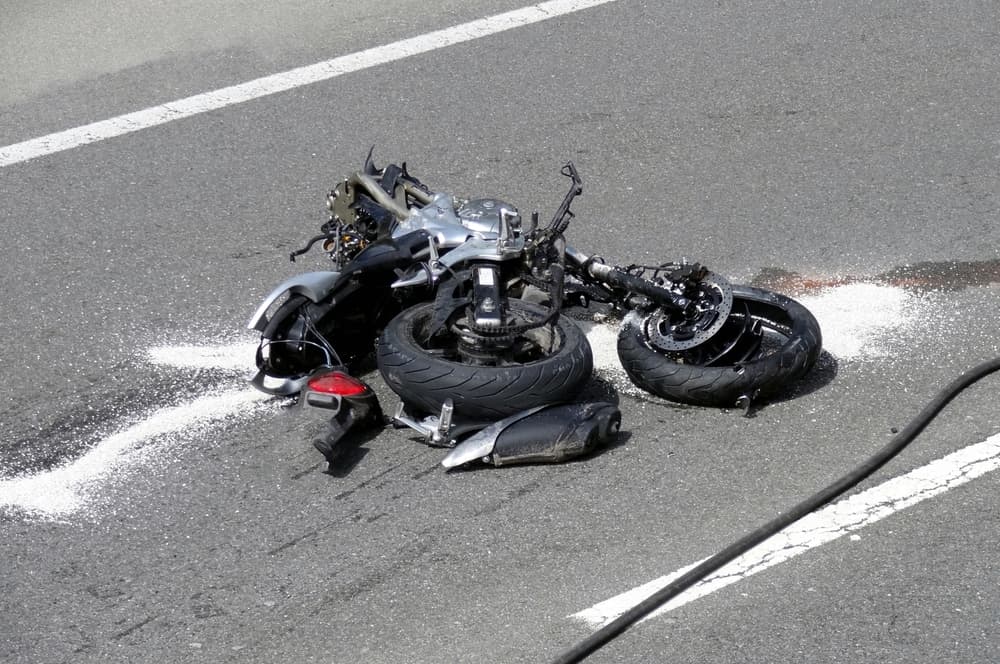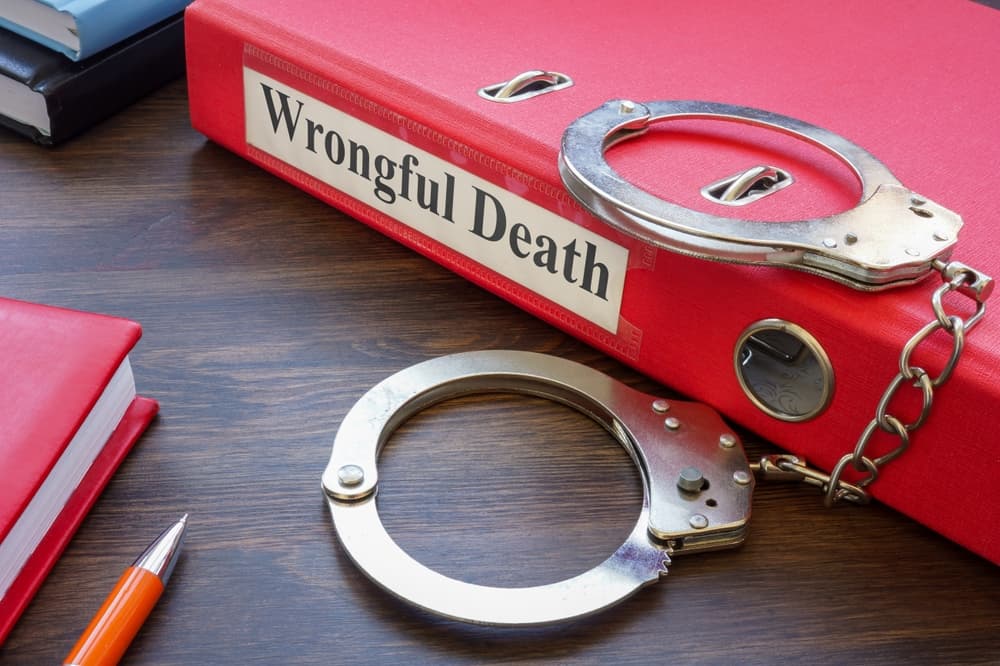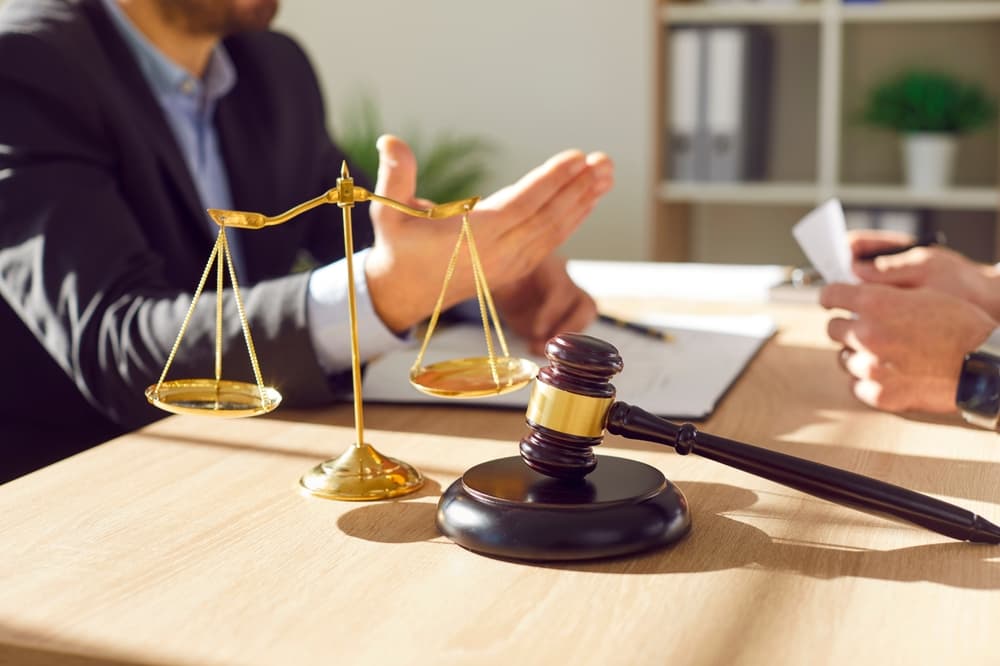Fatal motorcycle accidents typically happen when other drivers speed, engage in distracted driving or drive while under the influence of alcohol or drugs. In these situations, surviving family members may be eligible for compensation under the Fatal Accidents Act.
When it comes to pursuing justice and compensation, it’s essential to have an experienced wrongful death lawyer on your side. A lawyer will aggressively negotiate on your behalf or litigate the case to a resolution in court.
How Do Fatal Motorcycle Crashes Happen?

Fatal motorcycle accidents often happen due to the negligence of other drivers on the road. Since motorcycles are smaller and less visible than other vehicles, motorcyclists are more vulnerable to severe or fatal injuries in collisions. There are several ways in which negligent driving can lead to fatal motorcycle accidents.
- One common cause is distracted driving. Drivers who are texting, talking on the phone, or not paying attention to the road may fail to notice a motorcyclist in time to avoid a crash. A driver making a sudden lane change without signaling or checking blind spots can easily sideswipe a motorcycle, leading to a devastating accident.
- Speeding is another factor. When drivers exceed the speed limit, they reduce their reaction time and ability to stop safely, which becomes especially dangerous near motorcycles as a high-speed collision with a motorcycle is much more likely to result in fatal injuries to the motorcyclist.
- Drunk driving also contributes significantly to fatal motorcycle accidents. Drivers under the influence of alcohol or drugs have impaired judgment, slower reaction times, and a decreased ability to focus, all of which make them more likely to cause accidents. A drunk driver may run a red light or fail to yield the right-of-way to a motorcyclist, leading to a fatal collision.
- Left-turn accidents are another frequent cause of motorcycle fatalities. Many drivers fail to properly judge the speed and distance of an oncoming motorcycle when making a left turn at an intersection. As a result, they may turn directly into the motorcyclist’s path, causing a fatal accident.
- Tailgating is also extremely dangerous. Motorcycles can stop quickly, but drivers who follow too closely may not have enough time to react when the motorcyclist brakes. A rear-end collision can be deadly for a motorcyclist due to their lack of protection.
- Finally, reckless driving, such as running stop signs or weaving through traffic, can easily cause fatal motorcycle accidents. Motorcycles are less stable than cars, and a sudden, unpredictable move by a negligent driver can force a motorcyclist to swerve or lose control, leading to a fatal crash.
Filing a Wrongful Death Claim After a Fatal Motorcycle Crash
Filing a wrongful death claim following a fatal motorcycle accident can be a difficult process, but it allows family members to seek compensation for their loss. The steps of the process, the relevant laws, and who is eligible to file are important aspects to understand.
When a loved one dies in a motorcycle accident due to someone else’s negligence, the family may be entitled to compensation through a wrongful death claim. The first step is to gather evidence. This evidence includes accident reports, witness statements, medical records, and any proof that the other party was responsible, such as evidence of distracted or impaired driving. It is important to retain a lawyer who regularly handles wrongful death cases to navigate the process and ensure that all necessary documents are filed correctly.
The next step involves determining who is eligible to file the wrongful death claim. Typically, eligibility is limited to close family members, such as the spouse, children, parents, or sometimes siblings of the deceased. These individuals can seek compensation for the financial and emotional losses they have suffered as a result of the death. For example, they may be entitled to claim for funeral expenses, loss of companionship, loss of financial support, and other damages.
The Fatal Accidents Act plays a significant role in wrongful death claims. This law allows certain family members to seek compensation when a loved one dies in a collision due to another person’s negligence, such as a motorcycle accident. The Act sets guidelines on who is eligible to file a claim and what types of damages they can recover. It is designed to compensate family members for the pain and suffering they experience as a result of the death, as well as the loss of financial and emotional support.
Once the claim is filed, the process can include negotiations with the insurance company of the party responsible. If the parties cannot reach a settlement, the case may proceed to court, where a judge will decide the outcome.
The Fatal Accidents Act allows eligible family members to seek compensation for their loss, helping them recover financial and emotional damages after the tragic loss of a loved one.
Litigating a Wrongful Death Case Arising from a Motorcycle Crash

In wrongful death cases resulting from a motorcycle accident, families have several litigation options to seek compensation and justice for their loss. These options include resolving the case through a settlement, taking the case to trial, or pursuing alternative dispute resolution (ADR). Each option offers different advantages and should be considered carefully with the guidance of a lawyer.
One common way to resolve a wrongful death case is through a settlement. In a settlement, both parties – the family of the deceased and the at-fault party or their insurance company – come to an agreement on compensation without going to court. Settlements can be quicker and less stressful than a trial, saving the family time and legal fees. A settlement also keeps the details of the case private, which can be important for some families. However, one potential drawback is that the settlement amount may be lower than what can be awarded at trial. It’s essential for families to carefully evaluate any settlement offer with their lawyer to ensure that it is fair.
If settlement negotiations fail, the case may proceed to trial. At a trial, the family’s lawyer presents evidence and arguments to prove that the at-fault party was responsible for the wrongful death. A judge, and sometimes a jury, then decides the outcome. Trials can take a long time and may involve significant emotional and financial costs. However, if the family wins, the compensation awarded at trial can be higher than the amount offered in a settlement. Furthermore, trials provide a formal platform for seeking justice, which can be important to some families. The risk with a trial is that the outcome is uncertain since there is always a chance of losing the case; sometimes, no compensation is awarded.
An alternative to trial is alternative dispute resolution (ADR), such as mediation or arbitration. Mediation involves a neutral third party who helps both sides reach a voluntary agreement. Arbitration, on the other hand, involves a third party who listens to both sides and makes a binding decision. ADR is often faster and less expensive than going to trial and can be less adversarial. However, like settlements, the compensation awarded in ADR may not match what can be achieved at trial.
Each option has pros and cons, and families should work closely with their lawyer to determine the best course of action for their situation.
Types of Wrongful Death Damages
The Fatal Accidents Act allows families to seek compensation when a loved one dies in a fatal motorcycle crash resulting from someone else’s negligence. The available compensation helps families cope with the financial and emotional effects of losing a family member.
- One major type of loss or damage is for funeral and burial expenses. Following a fatal motorcycle collision, families often face unexpected costs related to the funeral and burial or cremation. The Act allows family members to be compensated for these expenses, helping to relieve the financial burden during an already difficult time.
- Another important part of compensation is for the loss of financial support. If the person who died was a provider for their family, their sudden death can lead to financial hardship. Compensation for lost income is intended to cover the money the deceased would have earned if they had not passed away. This compensation can help the family maintain financial stability and manage living expenses, even after losing their primary source of income.
- In addition to financial support, the loss of household services is also recognized. The deceased may have contributed to household tasks, such as cooking, cleaning, child care, or home maintenance. When these services are lost, families may need to hire someone to take over these responsibilities. Compensation for lost household services helps cover these additional costs.
- The Fatal Accidents Act also provides compensation for the loss of companionship and emotional support. Losing a family member can have significant emotional repercussions, especially if the deceased was a spouse, parent, or child. Compensation for loss of companionship reflects the emotional pain and the absence of support, guidance, and affection that the family will no longer receive from their loved one.
- Finally, the Act compensates for grief and emotional suffering (i.e., bereavement benefits). The sudden and tragic loss of a loved one in a motorcycle accident can cause deep emotional pain and trauma. Compensation for grief is meant to acknowledge the emotional toll that the family endures as a result of the accident.
A knowledgeable wrongful death lawyer can navigate the process and ensure families receive the full compensation they deserve.
How a Lawyer Can Help with a Wrongful Death Claim or Lawsuit

A wrongful death lawyer can provide essential support to families after a fatal motorcycle collision. Their role is to guide the family through the legal process, explain their rights, and ensure they receive the compensation they deserve. Dealing with the aftermath of a fatal accident is overwhelming, and having an experienced lawyer can make the process smoother and less stressful.
- One of the primary ways a wrongful death lawyer can help is by thoroughly investigating the accident circumstances. They can gather evidence to determine who is responsible for the crash, which may involve working with accident reconstruction experts, reviewing police reports, and collecting witness statements. Establishing fault is vital for building a strong case, and a lawyer knows how to gather the necessary information to prove negligence or wrongdoing.
- A lawyer can also explain to families the compensation they may recover as part of the wrongful death claim or lawsuit. Following a fatal motorcycle accident, families may be eligible for compensation covering funeral expenses, lost income, loss of companionship, and emotional suffering. A wrongful death lawyer can explain these categories and calculate a fair amount to claim, ensuring no potential compensation is overlooked.
- Navigating the legal system can be complicated – especially when grieving the loss of a loved one. A wrongful death lawyer handles all legal paperwork and deadlines so that the family does not have to worry about missing important steps, including filing a wrongful death claim, negotiating with insurance companies, and, if necessary, preparing the case for trial. Insurance companies often try to minimize payouts, but a lawyer will negotiate to get the maximum compensation for the family.
- If the case goes to court, a wrongful death lawyer will represent the family at trial. They present the evidence, argue the case, and work to convince the court that the family deserves compensation. While most cases are settled before trial, having a lawyer prepared to go to court can increase the chances of a fair settlement.
A wrongful death lawyer navigates the legal process, gathers evidence, negotiates with insurance companies, and represents them in court if necessary. Their goal is to ensure that the family receives the compensation they deserve, allowing them to focus on healing during a difficult time.
Speak with a Skilled Wrongful Death Lawyer Right Away
If you recently lost a loved one in a fatal motorcycle crash, a knowledgeable personal injury lawyer can be an invaluable help. A lawyer will work to maximize the compensation you and your family receive, helping lessen your burden.
